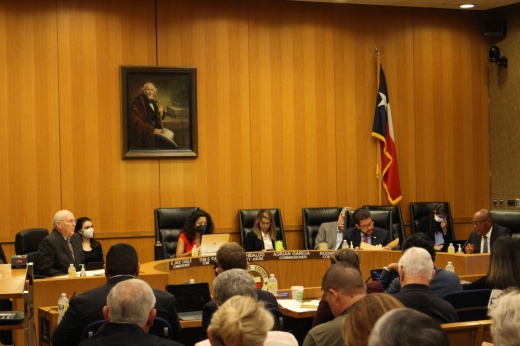Two separate motions passed 3-2, with Precinct 3 Commissioner Tom Ramsey and Precinct 4 Commissioner Jack Cagle opposed. The first motion from Precinct 2 Commissioner Adrian Garcia directs relevant county departments to formulate a bond proposal, which allocates up to $100 million for public safety facilities; $900 million for roads, drainage and multi-modal transportation; and $200 million for parks.
The second motion proposed by County Judge Lina Hidalgo addressed her previous concerns over how much funding would be allocated to each precinct. Although the language would not appear on the ballot for voters, the motion states that Commissioners Court would adopt guidelines to allocate bond funding using a “worst-first” approach to direct funds to areas of greatest need.
Under these guidelines, each precinct would receive a minimum of $220 million of the $1.2 billion, while $100 million would be reserved for public safety facilities regardless of their location. That leaves $220 million for distribution based on need, according to Hidalgo.
Precinct 1 Commissioner Rodney Ellis said he believes there had been a historical reluctance by Commissioners Court to confront the issue of equity in bond fund allocation and advocated for a portion of the bond to be set aside for
“One would have to feign a lack of intelligence or just have a total inability to say that this county has been equitable in how it has spent transportation money over the last 30 years—it has not,” Ellis said.
Ramsey—in keeping with his statement at the last meeting—voted no. While he agreed there was inequity, namely within city of Houston limits, he maintained the county did not have the trust of the community, has not been transparent enough and was calling for a bond a year too early.
“When I was here today and listening to all the input, I could only think of my three Ts that I’ve been talking about for some weeks now,” Ramsey said. “[With] the people I’m talking to in the areas that I represent, there’s not a lot of trust there because of very specific things that have occurred in this court.”
Commissioners still need to call a special session between Aug. 12-22 to formally vote to adopt a bond for the November election, since the next regular session of Commissioners Court falls on Aug. 23 outside of the allowed window.
Speakers weigh in
Much of the public comments from the Aug. 2 meeting centered on the bond, including from elected officials and law enforcement.
State Rep. Gene Wu, D-Houston, spoke in person in support of the bond, saying his community in southwest Houston is “tremendously concerned” about infrastructure and public safety.
“Everybody in my community—you mention those three things [flood control, roads and public safety]—people are down,” Wu said. “They don’t need to be sold [on them]. ... They’re going to vote yes.”
Another elected official, state Rep. Jon Rosenthal, D-Houston, spoke virtually in support of the bond, representing a district that is located primarily in unincorporated Harris County.
Several members from the Harris County Sheriff’s Office voiced support during public comments for these projects to be paid by the public safety portion of the bond, citing outdated facilities built over five decades ago that do not match the quality of Houston Police Department stations.
Apart from the general bond framework outlined in previous court meetings, backup documentation for a separate agenda item on capital improvement projects from the Office of Management and Budget lists five projects proposed by the Sheriff’s Office for a public safety bond, including a facility to train first responders on flood and swift water rescue operations and another facility to simulate active shooter scenarios.
Mike Lee, assistant chief of law enforcement at the Sheriff’s Office, backed the bond, claiming every deputy would say the facilities are inadequate.
“It’s more than pay—it’s working conditions,” Lee said. “It’s showing that we take pride in facilities, that we’re showing support for our law enforcement by having a nice facility to work in.”
HCSO Sgt. Walter Stensland said he has had to rely on partnerships with municipal utility districts for office spaces because of the lack of space in Sheriff’s Office facilities.
“It’s a supervisor’s nightmare when it comes to having all your people spread out around the county because we don’t have adequate space to put them all together,” Stensland said. “This is something that I think that we can all benefit from. We’ve outgrown our 50-year-old substation.”
Lee added that the Sheriff’s Office did not have a driving facility or an active shooter facility to train deputies, both of which were included in the proposed capital improvement project document. However, the projects did not have any cost estimates attached—something Cagle drew issue with during the evening discussion about the bond.
Beth White, president of the Houston Parks Board, touted the work already done to improve connectivity between precincts that she hopes would continue with additional funding.
A date for the official vote on the bond was not set at the Aug. 2 meeting but will be held sometime within the next two weeks.





